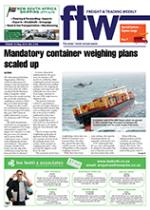Despite having its objections
to the licensing of FlySafair
dismissed by the Air Services
Licensing Council (ASLC),
Comair is still none too
happy about FlySafair’s
rights to fly in SA airspace,
according to CEO Erik
Venter.
In an ASLC hearing in
February, Comair raised
concerns regarding the
opaque nature of the new
shareholding structure of
Safair. It proposed that
“further investigation was
required into the structure
to identify its ultimate
beneficiaries and where
ultimate control lay”, Venter
said.
This followed a case in the
High Court last year when
Comair/Skywise Airline
disputed FlySafair’s claim
that 75% of its shareholding
was controlled by three
directors.
After a convoluted
argument about who-ownedwhat,
involving a complex
sequence of company sales
and acquisitions in SA and
Ireland (See FTW September
6, 2013), the court found in
favour of Comair/Skywise.
FlySafair, in its then
shareholding format, was
banned from the SA skies.
Safair was then looking
for another locally owned
25% shareholding to add to
the 50% controlled by SA
residents, CEO Dave Andrew
and chief financial officer
Elmar Conradie, and which
added up to that magic 75%.
And it has come up with
an interesting – but for
Comair arguable – new
shareholding set-up.
According to Andrew,
FlySafair has “got rid of the
shareholding that caused the
problems”.
He said that the airline
had concluded the largest
employee share ownership
scheme in the SA aviation
industry, giving its local
employees a 25.14% stake in
the company.
And, after the ASLC
rejected Comair’s objections
to the new structure, it
granted a Type S1 licence to
Safair to operate domestic
scheduled passenger
services.
“We have requested
reasons from the ASLC
for both the dismissing of
our objections as well as
the council’s decision for
granting the licence,” Venter
told FTW. “Once the reasons
have been disclosed, we will
consult with our legal team
whether sufficient grounds
exist to take the decision of
the ASLC on review in the
High Court.”
Backing Comair’s case is
the fact that SA and almost
all other countries around
the globe have placed a
restriction on the foreign
ownership in locally licensed
airlines.
“So,” Venter said, “ just as
foreign companies cannot
freely mine our natural
mineral resources or freely
fish in our marine territory,
foreign airlines also cannot
freely operate in our
territory.
Certainly not unless 75%
of the shareholding in such
entity is held by persons who
are ordinarily residents in SA.
And, according to Venter,
these persons must have
active and effective control
of the airline. “This means
that such persons must
carry the risks and rewards
associated with the airline.”
He added that there was a
real risk, which he said was
“present in the precedent
set by the granting of a
scheduled air service licence
to Safair”. This is that it
will allow large foreign
aviation companies to enter
the SA domestic airline
market by setting up “front
companies”. But where,
in reality, “the majority of
financial and operational
control of the airline
does not reside with SA
residents”.
But Lorna Terblanche,
vice-president passenger
services for FlySafair, was
confident that the employee
shareholding would be
able to withstand any
investigation made of it.
“After last year’s court
interdict against us, we spent
a whole three months putting
together this share benefit
scheme,” she told FTW.
“We then re-applied for
our licence to the ASLC and
their legal team examined
everything.”
And finally, this licence
was granted on March 31.
“I don’t see how they
(Comair) can say it’s fronting.
We are confident that
everything is above board,”
Terblanche added.
CAPTION
Ready for takeoff… FlySafair is confident it will hold tight
under any scrutiny.
INSERT & CAPTION
Just as foreign
companies cannot
freely mine our
natural mineral
resources, foreign
airlines also cannot
freely operate in our
territory.
– Erik Venter

